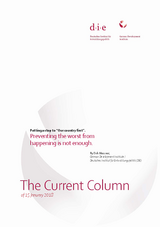The Current Column
Putting a stop to “Our country first”
Preventing the worst from happening is not enough.
Messner, DirkThe Current Column (2018)
Bonn: German Development Institute / Deutsches Institut für Entwicklungspolitik (DIE), The Current Column of 15 January 2018
Bonn, 15 January 2018. We live in turbulent times. The world (economy) is becoming increasingly interconnected, as are political issues around the globe. However, it is the new nationalist approach to world affairs, as represented by Trump, Orban, Putin, Erdogan, Le Pen and even the Austrian coalition government comprising the ÖVP and FPÖ parties, that is characterising international policy debate. The Trump administration is challenging the Paris climate agreement, attacking the UN, and building and planning physical and legal walls against Muslims, Latin Americans, other undesirables and even goods, provided it serves its own interests. With the annexation of Crimea, Putin has underscored his tactical approach to international law. His mentor Alexander Dugin and ex-Trump-whisperer Steve Bannon boast in unison about the destruction of multilateralism and the end of liberal, pluralistic democracies. Erdogan is jailing bothersome Turks and foreign citizens and flouting human rights law. Le Pen, Orban, the new Austrian Government and kindred spirits in Germany’s AfD party are refusing to show humanity to 65 million refugees, who they believe should instead migrate from one poor African country to another. This approach cannot go well in the long term. In a globally connected world, aggressive nationalism will inevitably serve to exacerbate conflict. This brings to mind the first major wave of globalisation heading into the 20th Century, which Philip Blom expertly described in his book “The Vertigo Years: Europe, 1900-1914”. The dynamics of that wave resemble those of current trends: surges in urbanisation, technological breakthroughs, accelerated global trade, and scientific breakthroughs, such as the development of modern physics and the successful work of Louis Pasteur and Robert Koch in fighting major human epidemics. Things would never be the same again. These radical global changes were also reflected in the emergence of modern art. Kandinsky’s transition to abstraction (from 1910 onwards) and Kazimir Malevich’s “Black Square” (1915) rubbed up against traditional perspectives. The accelerating modernisation process triggered radical changes in economic, cultural and social structures, overstretched governments and left societies stressed and lacking orientation. Identity crises and distribution conflicts gave rise to aggressive nationalism and the two World Wars of the 20th Century. Against this backdrop, the current “Our country first” movements serve as warning signs that should be taken seriously. If accelerated structural change and the associated social and cultural uncertainty are not embedded in attractive future strategies and policy-making approaches, then ground will be lost to nationalists capitalising on people’s anger and fear. Macron’s election victory in early 2017 was a clear sign in favour of democracy, Europe and international cooperation. And the German Government was also somewhat successful during its G20 Presidency in 2017 in preventing the worst happening. Trump failed to find allies for his anti-climate policy, the G20 formulated multilateral commitments, nationalist rhetoric was kept in check. Despite all this, however, nationalists changed the order of things in a number of areas. Their discourse divides the international community. Consequently, it is time to do more than simply prevent the worst from happening. The nationalist surge should be countered through the establishment of strong, vocal and visible alliances to promote a culture of global cooperation and a sustainable globalisation process and thus regain the prerogative of interpretation regarding the future. If I had one wish left for 2018, it would be for transnational networks for global sustainability, such as the global Sustainable Development Solutions Network (SDSN), the ICLEI municipality network and the Future Earth research consortium, to begin making preparations to hold a World Future Conference in 2020. They would be joined by like-minded governments from rich and poor nations, culture-makers and business and investor networks interested in getting the global economy and global society ready for the future. They would discuss three specific beacon projects, to be implemented by the protagonists of the World Future Conference: (1) Practical roadmaps for reducing societal inequalities; improving the Gini index on national levels would be a key development parameter, as relevant as achieving economic growth; (2) Effective measures to combat tax avoidance, which is destructive to the common good; introduction of a minimum tax rate internationally; (3) Effective climate action as the basis for economic modernisation and welfare projects; the last coal-fired power stations in the participating societies would be closed by 2035, by which time no more fossil fuel-powered vehicles would be sold and emissions would be halved each decade until they reach zero in 2050; revenue from greenhouse gas emission taxes would be invested in transformation projects for sustainable mobility, energy and cities and in national and international projects to promote social cohesion. Wishful thinking? Perhaps. But simply “preventing the worst from happening” will not be enough to stop the erosion of democracy and a global cooperation culture.


